Citigroup revealed its third-quarter earnings on Tuesday, showcasing results that exceeded Wall Street’s expectations, primarily driven by strengths in investment banking and wealth management. The bank reported earnings per share (EPS) standing at $1.51, surpassing analysts’ predictions of $1.31, while revenue reached $20.32 billion, exceeding the anticipated $19.84 billion. Despite these positive indicators, Citigroup’s net income did fall to $3.2 billion from $3.5 billion the previous year, signaling underlying challenges such as increased credit costs that impacted overall profitability.
The bank’s decision to allocate more resources towards potential loan losses raises questions about the sustainability of its growth trajectory. Citigroup recorded a net build of $315 million in its allowance for credit losses, indicating a cautious stance in light of economic uncertainties and potential risks associated with consumer and corporate lending.
A deeper dive into Citigroup’s performance reveals noteworthy growth across various sectors. Investment banking revenue soared by an impressive 31%, contributing significantly to an overall 18% increase in banking revenue, which bodes well for the institution’s recovery and market positioning. However, fixed income revenue saw a decline of 6%, contrasting with the 32% growth in equity markets revenue. This discrepancy underscores the volatility within financial markets and the challenges Citigroup faces in maintaining balanced growth across its divisions.
Wealth management also stood out with a solid 9% rise in revenue, highlighting the potential for expansion in this crucial domain. This uptrend suggests that Citigroup is strategically aligning its efforts to capitalize on wealth management as a sustainable growth avenue. The overall increase in revenue to $20.32 billion reflects the bank’s adeptness at leveraging opportunities in a competitive banking landscape.
CEO Jane Fraser, who took the helm in March 2021, is in the midst of a significant transformation strategy aimed at redefining Citigroup’s global operations. Her leadership emphasizes streamlining the bank’s structure, which has involved reducing its global footprint and implementing workforce reductions to enhance operational efficiencies. During the recent earnings call, Fraser articulated the commitment to this transformation, highlighting the closure of a longstanding regulatory issue tied to anti-money laundering systems, showcasing the bank’s focus on compliance and governance.
Fraser’s strategy highlights a critical acknowledgment of the need for improved control measures, particularly in areas like data quality management. With a firm belief in transparency and accountability, the management aims to bolster Citigroup’s standing within the regulatory landscape while pivoting its business model towards resilience and adaptability to market changes.
Despite the optimistic financial outlook, Citigroup faces hurdles, particularly in net interest income, which fell by 3% year over year to $13.4 billion as margins contracted. The performance of net interest income excluding the markets business also depicted a decline, raising concerns about the bank’s positioning amidst fluctuating interest rates. While management anticipates stability in upcoming quarters, concrete guidance for 2025 remains elusive, potentially signaling a lack of clarity regarding future earnings power.
The bank’s efforts to reduce expenses by 2% year-over-year illustrate a proactive approach to cost management. Nonetheless, the convergence of these factors poses a mixed outlook for Citigroup’s operational health and market competitiveness.
In the wake of its earnings announcement, Citigroup shares experienced a decline of 5.1%, reversing earlier gains seen before market opening—an indication of investor caution amid growth concerns. Despite year-to-date gains of over 28%, outperforming major indices, the market’s immediate response suggests a critical evaluation of whether the growth strategies pursued can sustain momentum as economic pressures loom.
Further benchmarking against other banking giants such as Goldman Sachs and JPMorgan Chase, both of which reported robust earnings that exceeded expectations, reflects the continuing competitive pressures in the financial sector. With a rapidly changing economic landscape, Citigroup’s management faces the dual challenge of cultivating growth while maintaining regulatory compliance and fortifying its financial foundation.
While Citigroup demonstrates resilience and potential, the pathway forward requires deft navigation through turbulent waters marked by both opportunities and inherent risks.

